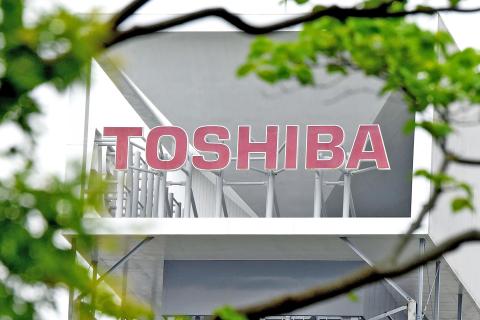US tech titans Apple Inc and Dell Inc have joined a bid to buy Toshiba Corp’s memorychip business, a deal seen as key to the survival of the cash-stripped Japanese industrial conglomerate, the US investor leading the consortium has said.
“Last week, Bain Capital made a revised offer” for Toshiba, which “brings in a broad list of strategic partners including Apple, Dell” and others who will invest in the business, Bain Capital said in a statement yesterday.
It was the first time Apple’s name has been officially confirmed as part of the bid, although it has reportedly also been involved in rival bids for the lucrative Toshiba segment.

Photo: AFP
The iPhone maker is in talks to provide about US$3 billion in capital for the bid. If the agreement is completed, it might exceed Apple’s largest deal, the US$3 billion acquisition of Beats Electronics LLC.
The announcement came after Toshiba last week said that it had picked the Bain Capital-led consortium as the leading candidate to buy its prized chip business in a deal reportedly worth about US$18 billion.
The development was the latest twist in a long-running saga as Toshiba agonizes between three groups of suitors for its chip business.
The Bain Capital-led group also includes the state-backed Development Bank of Japan and the public-private Innovation Network Corp of Japan as well as South Korean chipmaker SK Hynix Inc.
However, Toshiba has said that it was a “non-exclusive” agreement with Bain Capital that “does not exclude the possibility of negotiations with other consortia.”
Other suitors in the frame are a group led by Western Digital Corp, Toshiba’s US-based chip factory partner, and Hon Hai Precision Industry Co (鴻海精密), better known as Foxconn Technology Group (富士康).
Toshiba is aiming to finalize the deal at a board meeting on Wednesday, despite opposition from partner Western Digital, according to people familiar with the matter.
Toshiba’s effort faces resistance because the Bain Capital-led group includes several Western Digital competitors, including Seagate Technology PLC, Kingston Technology Co and SK Hynix, said the people, asking not to be identified because the matter is not public.
Toshiba has sued Western Digital for trying to block the sales process.
“We believe this proposal represents a solution that meets the needs of all stakeholders,” Bain Capital said in the latest statement.
The proposal “represents the best possible outcome for Toshiba by ensuring” the memorychip business’ independence, Bain Capital said.
Kaori Hiraki, a spokeswoman for Toshiba, said she could not comment on the details of the deal.
Additional reporting by Bloomberg

Intel Corp chief executive officer Lip-Bu Tan (陳立武) is expected to meet with Taiwanese suppliers next month in conjunction with the opening of the Computex Taipei trade show, supply chain sources said on Monday. The visit, the first for Tan to Taiwan since assuming his new post last month, would be aimed at enhancing Intel’s ties with suppliers in Taiwan as he attempts to help turn around the struggling US chipmaker, the sources said. Tan is to hold a banquet to celebrate Intel’s 40-year presence in Taiwan before Computex opens on May 20 and invite dozens of Taiwanese suppliers to exchange views

Application-specific integrated circuit designer Faraday Technology Corp (智原) yesterday said that although revenue this quarter would decline 30 percent from last quarter, it retained its full-year forecast of revenue growth of 100 percent. The company attributed the quarterly drop to a slowdown in customers’ production of chips using Faraday’s advanced packaging technology. The company is still confident about its revenue growth this year, given its strong “design-win” — or the projects it won to help customers design their chips, Faraday president Steve Wang (王國雍) told an online earnings conference. “The design-win this year is better than we expected. We believe we will win

Chizuko Kimura has become the first female sushi chef in the world to win a Michelin star, fulfilling a promise she made to her dying husband to continue his legacy. The 54-year-old Japanese chef regained the Michelin star her late husband, Shunei Kimura, won three years ago for their Sushi Shunei restaurant in Paris. For Shunei Kimura, the star was a dream come true. However, the joy was short-lived. He died from cancer just three months later in June 2022. He was 65. The following year, the restaurant in the heart of Montmartre lost its star rating. Chizuko Kimura insisted that the new star is still down

While China’s leaders use their economic and political might to fight US President Donald Trump’s trade war “to the end,” its army of social media soldiers are embarking on a more humorous campaign online. Trump’s tariff blitz has seen Washington and Beijing impose eye-watering duties on imports from the other, fanning a standoff between the economic superpowers that has sparked global recession fears and sent markets into a tailspin. Trump says his policy is a response to years of being “ripped off” by other countries and aims to bring manufacturing to the US, forcing companies to employ US workers. However, China’s online warriors